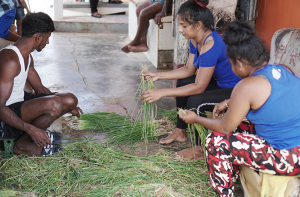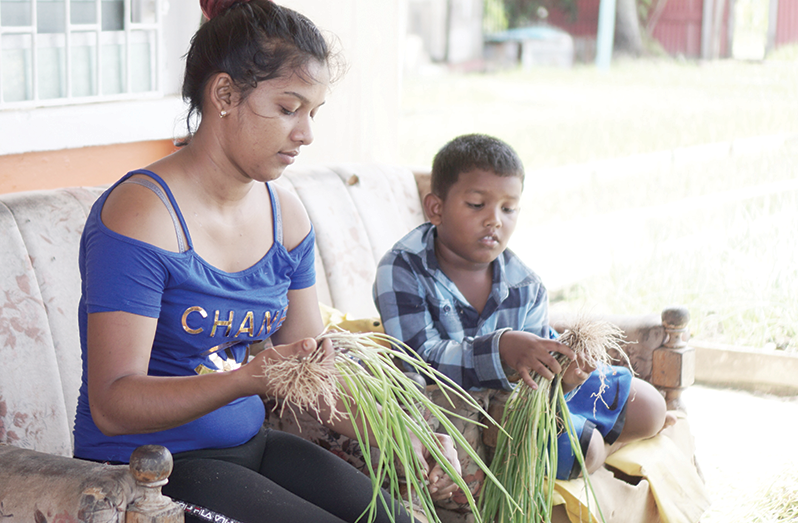By Michel Outridge
SITTING and cleaning heaps of freshly pulled eschallot from their backyards is something the people of Bath Village, West Coast Berbice, are accustomed to in their bid to earn.
This was exactly the scene at the home of Dineshwar Andrew called ‘Terry,’ who had pulled several banks of shallots and was cleaning it along with three others to make the work lighter.
The father of one explained that they would plant only eschallots and when it is time to harvest, he would pull as many as possible and they would have to clean it first before it is weighed and parcelled for wholesale buyers, who often offer them just $80 per pound.
The 27-year-old added that he is a full-time cane harvester, but on the days he is not working he would assist in the garden.
He explained that like almost every household in the village, they too are cultivating eschallots and one bank would give them about 100 pounds of eschallots, which will be weighed and parcelled off to be sold.
Andrew stated that it is a small family business and they would help, because the ‘eschallot business’ is a lot of work.
“You wouldn’t make a lot of profit because you have to invest time and money to tend to the shallots by watering it, fertilise it and pluck it as well as maintaining the banks and so on,” he said.
Andrew added that some people would sell the eschallot at the village market, but often wholesale buyers would make the bulk purchase and sell it elsewhere outside the village to make a hefty profit.
The Village fisherman, first resident of that section of Bath Village

Meanwhile, Andrew’s relative Alfred Muttoo has been a fisherman for more than 50 years.
He has two fishing boats and the men in the family are also fishermen, who would make regular fishing trips in the Atlantic Ocean.
Muttoo explained that he was a full-time cane-cutter with the Blairmont Sugar Estate and used to do fishing on a part-time basis and as he perfected the skill, he gave up cane-cutting and started fishing as his sole earner.
The 68-year-old reported that he would make most fishing trips which would last between three to four days or a week, depending on the catch and freezer space.
This trip he didn’t go, but his grandson and son went out to sea with a fishing boat and were expected back shortly.
Muttoo added that they would go about three miles offshore and make their catch of gilbaka, snapper, trout, banga mary and whatever fishes are in season, filling three freezers containing ice.
The father of three pointed out that being a fisherman is a skilled job like most jobs and he would often make a good catch when the tide is calm and fishes have seasons just like the weather.

As a seasoned fisherman, he is versed in reading the weather pattern and he knows what kind of fish would be in season and he would take advantage of that and use it to make a good catch.
Muttoo has three carts and a donkey he would use to sell the fish in the village whenever he returns from his fishing trips.
He is a resident of Bath Village and is well-known and respected in the community.
Muttoo told the Pepperpot Magazine that when he bought the plot of land there were no houses, the place was a swamp, over-run by vine-like vegetation and he cleared the land and built a house and started living there as the very first resident.
“I bought this land in 1969 for just $900 and back then it was a lot of money and I was a cane-cutter then; and after construction, which took some time, I began living here in 1978 as the only resident in this side of the village,” he said.
Muttoo stated that it has been 43 years since he is a resident of Bath Village, a place that is often quiet and breezy but like every village, they have some social issues with the young people who are addicted to drugs and alcohol and are pilfering and breaking into houses.


.jpg)











